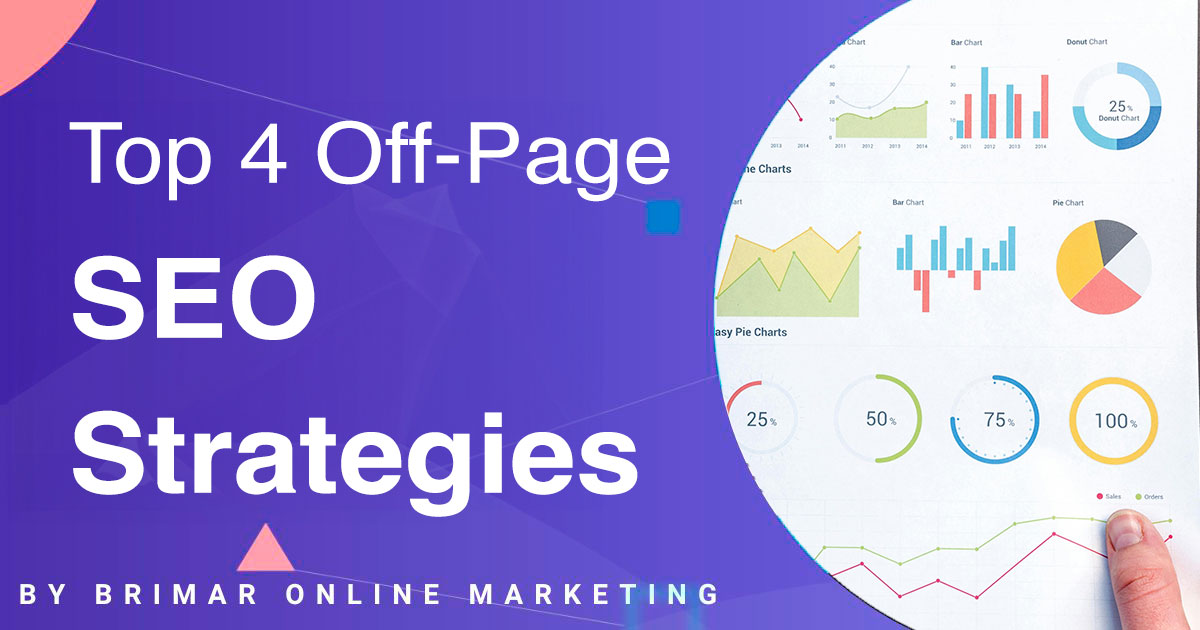
Imagine this: You have just purchased a supercar and take it out for a long drive on a weekend.
However, in the middle of the road, you realize your car doesn’t have a single drop of fuel, throwing all your adrenaline-fueled plans into disarray and leaving you stranded.
In the world of Search Engine Optimization, off-page SEO is the fuel, and on-page SEO is the supercar’s engine.
If you want your website (supercar) to perform optimally, you need both fuel and a powerful engine.
So, if off-page SEO is so important for a website, you must be wondering how you can ensure you are doing it the right way.
Firstly, you must hire an SEO marketing agency to create valuable marketing tactics for your website.
Secondly, you must be aware of the strategies mentioned below that will help you succeed online.
What is Off-page SEO?
Before you dive into off-page SEO strategies, it is crucial to understand what it is.
Off-page SEO refers to the actions taken outside of your website that impact your ranking within the search engine results pages.
It primarily involves building backlinks from other websites, social media marketing, and a few local SEO strategies that improve your website’s authority, relevance, and trustworthiness in the eyes of the search engines.
The following section of the article talks about some of the important off-page SEO strategies in detail for online success:
Start Attracting Customers Through SEO Today!
We can help you attract new customers through Tailored Search Engine Optimization Strategies for Your Business.
Top Off-Page SEO Strategies
1. Link Building:
Link building is an SEO strategy in which different websites link to your website, thus increasing the authority of your website in the eyes of Google.
One thing to remember here is that links from high-authority websites are considered more valuable than others because they testify that your website is also highly authoritative and credible.
The idea is simple: when a DA website links to your website, Google perceives your website to be equally credible.
Here are some of the common link-building tactics that come under off-page SEO:
- Building broken links: In a broken link-building strategy, a website owner tries to find broken links that a website has linked to and convince them to replace them with yours.
- Unlinked brand mentions: If a website has mentioned a brand in its content or blog post, the owner asks them to add a link to the brand mentioned with one of their web page URLs.
2. Local SEO:
Local SEO is a strategy that increases your brand visibility and awareness in local search engine results.
The following are two off-page SEO strategies that come within local SEO:
- Google Business Profile: Google Business Profile is a free tool offered by Google that helps website owners control how the search engine views their business. It is important to optimize your GBP to ensure you rank high on local search results. Some of the ways you can do so are by ensuring that you provide clear contact information, responding to all the Google reviews, and publishing posts regularly.
- NAP SEO: NAP SEO refers to the consistent listing of a business’s name, address, and phone number across various online platforms. Ensuring uniformity in NAP information improves local SEO rankings and enhances online visibility.
3. Content Marketing:
Content marketing is a strategy that focuses on publishing valuable content that is aimed towards earning high DA backlinks and enhancing the Experience, Expertise, Authoritativeness, and Trustworthiness (E-E-A-T) of your website.
- Social media marketing: Social media has changed the entire realm of content marketing. Marketers now need to prioritize producing high-quality, relevant, and engaging content that provides value to their readers and publishing it on different social media platforms.
- Influencer marketing: Influence marketing entails collaborating with industry experts to promote your products and services in order to amplify your reach and credibility.
- Digital PR: Digital PR refers to increasing brand awareness through press release creation and distribution, media outreach, event planning and promotion, and sponsorship opportunities. It is a great way to drive referral traffic and promote your brand in front of your target audience.
- Guest Posting: Guest posting is a brilliant way to put your brand in front of different audiences and can also be a great tactic to earn valuable backlinks.
4. Events:
Organizing events is one of the most sought-after off-page SEO strategies and has a ripple effect when it comes to spreading brand awareness.
If a brand or service organizes events from time to time, it improves its brand awareness and increases the chances of earning brand mentions across different social media platforms.
Moreover, this creates a buzz around a business and sometimes helps earn backlinks if a content creator writes about the event and links a brand mention with relevant URLs.
Enhancing Your Search Engine Rankings with Off-Page SEO Techniques
To maximize your website’s potential and ensure long-term growth, let’s delve deeper into off-page SEO tactics.
This additional information will complement the strategies already discussed and provide business owners with actionable insights to boost their online presence and drive organic traffic.
The Role of Blog Posts in Off-Page SEO
Blog posts play an essential role in building your website’s authority.
Regularly publishing high-quality content on your own website helps attract natural links from relevant websites.
For instance, writing on a specific topic that resonates with your audience can inspire external links from reputable websites, significantly enhancing your domain authority.
- Guest blogging: Collaborating with third-party sites to create guest posts allows you to tap into a wider audience. This strategy generates relevant backlinks and positions you as a thought leader in your industry.
- Shareable content: Engaging and shareable content in your blog posts can amplify your reach on social media. People who find value in your posts are more likely to share them, indirectly improving your website’s visibility.
Best practices: Optimize your blog posts with a title tag, meta descriptions, and target keywords. Including internal links to related articles within your website also improves the user experience and encourages visitors to explore more content.
Social Media Engagement: An Essential Off-Page SEO Factor
Social media platforms are an excellent way to increase the reach of your content.
Sharing your blog posts or other high-quality content on platforms like Facebook, Twitter, and LinkedIn can increase visibility and drive website traffic.
- Best off-page SEO techniques involve encouraging positive reviews and engagement. Responding to comments and interacting with followers fosters trust and builds a loyal community.
- Use anchor text in your social media posts to direct potential visitors to your website. When paired with relevant hashtags, this can enhance your reach to a larger audience.
The Importance of Natural Links and High-Quality Backlinks
One of the most effective ways to improve your off-page SEO efforts is to secure natural links from authoritative websites.
These links occur organically when other sites find your content valuable and reference it as a reliable source.
- High-quality backlinks are a critical component of Google’s algorithm. They signal to search engines that your content is credible and worth ranking higher.
- To gain links from relevant websites, consider offering free resources such as guides, infographics, or in-depth analyses of industry trends. This approach aligns with content creation strategies and naturally attracts external links.
Pro tip: Use Google Search Console to monitor your backlinks and identify areas where you can improve your off-page SEO strategy.
Leveraging Local Citations and Positive Reviews for Better Rankings
Local citations and positive reviews can significantly influence search engine rankings for local businesses.
Listings on platforms like Yelp, Bing Places, and Apple Maps provide consistent and accurate business information, which improves your website’s visibility in local searches.
- Check that your brand name, address, and contact information are uniform in all listings.
- Encourage satisfied customers to leave positive reviews, as they are an important role in enhancing your online reputation and attracting potential customers.
Best practices: Use geo-specific target keywords and phrases to optimize your profiles for local SEO.
Enhancing Website Traffic Through Blog Commenting
Engaging in blog commenting on relevant websites is another off-page SEO tactic that can drive website traffic.
By contributing thoughtful comments or insights, you will establish your expertise and create opportunities to include high-quality links back to your site.
- When commenting, focus on adding value to the discussion rather than simply promoting your content. This will ensure that your contributions are well-received and considered credible.
Example: Commenting on a blog post about off-page SEO factors with a link to your website’s detailed guide can help you attract readers interested in the topic.
Optimizing Anchor Text for Better Rankings
Anchor text is another critical element of off-page SEO efforts.
The clickable text in a hyperlink tells search engines and users what the linked page is about.
Using keyword-rich and descriptive anchor text is one of the best ways to signal relevance and improve domain authority.
- Avoid over-optimization by using the exact anchor text repeatedly. Instead, diversify your keywords to make your links appear more natural.
Best practices: Perform regular keyword research to identify relevant keywords and incorporate them into your linking strategy.
Building External Links Through Guest Blogging
We’ve touched on guest blogging, but let’s explore why it remains a cornerstone of off-site SEO:
- Writing guest posts for authoritative websites exposes your content to a wider audience and helps you gain high-quality backlinks.
- Ensure your content creation aligns with the host site’s tone and interests while subtly integrating links to your own website.
Monitoring Off-Page SEO with Google Search Console
Tracking your off-page SEO tactics is essential for continuous improvement.
Google Search Console offers insights into your backlink profile, including relevant backlinks and overall site performance.
Use this tool to:
- Identify which external factors are driving the most website traffic.
- Monitor how external links impact your search engine rankings.
- Adjust your strategy based on the performance of your high-quality backlinks.
Focusing on User Experience Through Off-Page SEO
While technical SEO and site structure play a role in user experience, your off-page activities also contribute.
For example:
- High-quality content that is frequently shared or linked to enhances your brand’s reputation.
- Positive interactions on social media and review platforms encourage trust, leading to higher engagement and better rankings.
Following these best practices can help you implement a robust off-page SEO strategy that improves your search engine rankings and fosters long-term growth.
As a business owner, embracing these tactics will ensure your website thrives in a competitive digital landscape.
Conclusion:
As a business owner, you must understand that off-page SEO is as important as on-page SEO.
Even though the results of off-page SEO may not be as direct as the latter, it has a huge impact on how your website performs in search engine results and influences the overall success of your business.
Our SEO Services Have Helped Our Clients Increase Their Revenue!
“I highly recommend Brimar if your looking to grow your online business. You will be satisfied with the high level of expertise and high quality of services. It has helped my business grow by leaps and bounds.”
CEO

